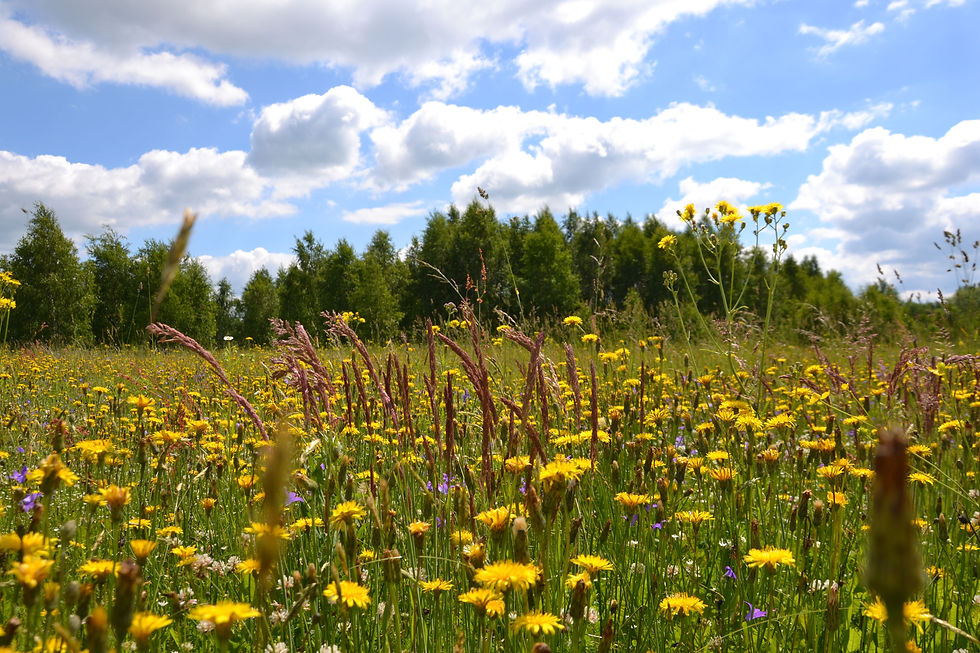Polyflower Honey from Lithuania
- Dina Maria
- May 19, 2025
- 3 min read
Updated: Jun 18, 2025
Polyflower honey, also known as multifloral honey, is a unique product of the diverse flora found in Lithuania. This honey is produced by bees that gather nectar from a wide variety of flowering plants, which thrive in the country's rich and varied ecosystems. Lithuania's climate, characterized by warm summers and cold winters, plays a significant role in the availability of diverse floral sources throughout the seasons, contributing to the production of polyflower honey.

Production Process
The production of polyflower honey in Lithuania involves several key steps:
Nectar Collection
Bees collect nectar from multiple flowering plants, including wildflowers, herbs, and trees. The diversity of these plants is essential for creating the multifaceted profile of the honey.
Honey Processing
Once the nectar is collected, bees convert it into honey through a process of enzymatic action and evaporation. The nectar is stored in honeycombs, where it undergoes further transformation as bees fan their wings to reduce moisture content.
Harvesting
Beekeepers harvest the honey typically during the late summer months when the bees have collected enough nectar. The honey is extracted from the combs and undergoes minimal processing to retain its natural properties.
Geographical Significance
Lithuania's varied landscape, which includes forests, meadows, and agricultural fields, provides an ideal environment for bees to access a wide range of floral resources. The country's commitment to sustainable beekeeping practices further enhances the quality of the honey produced.
Cultural Importance
Polyflower honey holds a significant place in Lithuanian culture and traditions. It is often used in local cuisine, rituals, and as a symbol of hospitality. The production of honey is also a traditional craft passed down through generations, reflecting the deep-rooted relationship between the people of Lithuania and their natural environment.
Market and Availability
Lithuanian polyflower honey is available in local markets and specialty stores, often packaged in jars that highlight its origin. It is also exported to various countries, appreciated for its natural and artisanal qualities. The honey is often sought after by consumers looking for authentic, locally-sourced products.
Conclusion
Polyflower honey from Lithuania is a product of the country's rich biodiversity and traditional beekeeping practices. Its production process, geographical significance, cultural importance, and market presence contribute to its unique identity in the realm of honey varieties.

Flavors and Characteristics of Polyflower Honey
Polyflower honey, also known as wildflower honey, is derived from the nectar of various flowers, resulting in a unique and diverse flavor profile. Here are some key characteristics:
Flavor: The taste of polyflower honey can vary significantly depending on the types of flowers available in the region. It often has a mild to medium sweetness with floral undertones, and may include hints of fruit, spice, or herbaceous notes.
Aroma: The aroma is typically fragrant and floral, reflecting the variety of blossoms from which the nectar is collected.
Color: The color can range from light amber to dark amber, influenced by the specific flowers and the time of year.
Texture: Polyflower honey is generally smooth and viscous, with a creamy consistency that can vary based on its moisture content.

Health Benefits of Polyflower Honey
Polyflower honey offers several health benefits, making it a popular choice among natural sweeteners:
Rich in Antioxidants: It contains a variety of antioxidants, which help combat oxidative stress and may reduce the risk of chronic diseases.
Antimicrobial Properties: The natural compounds in honey can inhibit the growth of certain bacteria and fungi, contributing to its use in wound healing.
Soothing for Cough and Throat Irritation: Polyflower honey is often used as a natural remedy for coughs and sore throats due to its soothing properties.
Energy Boost: The natural sugars in honey provide a quick source of energy, making it a great option for athletes and those needing a quick pick-me-up.
Allergy Relief: Consuming local polyflower honey may help alleviate seasonal allergies, as it can expose the body to small amounts of pollen.
Digestive Health: Honey has prebiotic properties that can promote gut health by supporting the growth of beneficial bacteria.
In summary, polyflower honey is not only a delicious natural sweetener but also offers various health benefits, making it a valuable addition to a balanced diet.






Comments